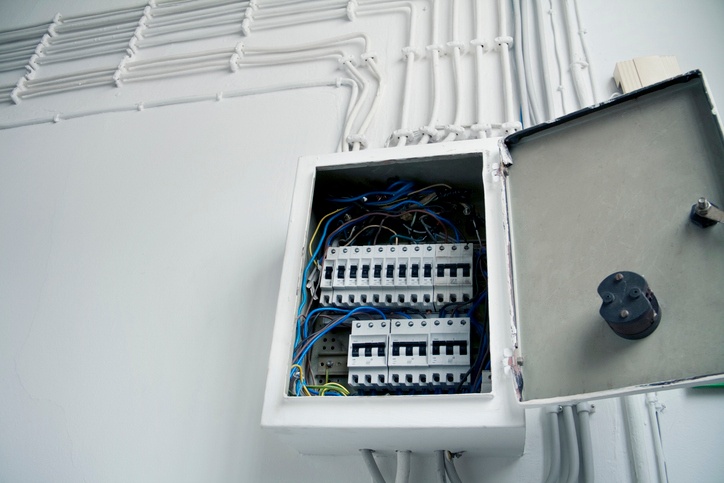Benefits of Upgrading Your Electrical Panel
If you live in an older home or are planning new renovations, an electrical panel upgrade might be one of the most important improvements you can make. At Delta Electric, we offer reliable electric panel upgrade services in San Jose, CA, to improve your home’s safety, energy efficiency, and overall electrical performance.
What Is an Electrical Panel Upgrade?
A home electrical panel upgrade involves replacing or enhancing the main panel that distributes power throughout your house. Also known as a breaker box or electrical panel board, this unit manages the flow of electricity to various circuits, ensuring each part of your home receives the appropriate amount of power. Over time, older panels may become outdated, overloaded, or even unsafe—particularly in homes with increased electrical usage due to high-tech appliances, home offices, EV chargers, or HVAC systems. Upgrading your panel helps ensure your electrical system can safely handle current and future energy needs while reducing the risk of outages, surges, or fire hazards.

Understanding Electric Panel Upgrades
The electrical panel is the central hub of your home’s electrical system. It contains breakers that shut off circuits in case of overloads or faults. If your panel is struggling to meet demand or shows signs of wear, it’s time to consider a residential electrical panel upgrade. Key reasons to upgrade include frequent breaker trips, overheating panel or burning smells, visible corrosion or damage, and insufficient amps for new appliances.
Types of Electrical Panel Upgrades
Not every upgrade looks the same. Depending on the age of your home, your electrical usage, and future plans, your electrician will evaluate your system and recommend the most appropriate type of panel improvement. Each type of upgrade is designed to enhance performance, increase safety, and ensure your system can meet modern energy demands. Types of upgrades include:
- Full electrical panel replacement for outdated or unsafe units that may pose fire or shock hazards
- Amperage upgrades (e.g., from 100 amps to 200 amps) to accommodate increased power usage from appliances, HVAC systems, or EV chargers
- Subpanel installation for home additions, workshops, or detached garages that need their own circuit control
- Smart panel upgrades that provide remote monitoring, energy tracking, and the ability to manage circuits via smartphone or tablet
Advantages of Residential Electrical Panel Upgrades
Upgrading your home’s electrical panel significantly improves the overall performance and safety of your electrical system. Modern panels use updated, code-compliant equipment that enhances protection against electrical hazards. They also provide the capacity needed to support high-powered devices like HVAC systems, ovens, and electric vehicle chargers. With a properly sized and upgraded panel, your circuits experience less strain, leading to better energy efficiency. As a result, you’re also less likely to deal with common issues like flickering lights or frequently tripped breakers.
The Impacts of Panel Upgrades
An electric panel upgrade impacts your entire electrical system. It ensures that power is distributed safely and consistently, preventing fires, shocks, and other hazards. It also prepares your home for future upgrades, such as solar panel installations or major renovations that require increased power capacity. By upgrading your house electrical panel, you reduce risk and ensure long-term dependability.
Top Benefits of Upgrading Your Electrical Panel
There are clear reasons why a home electrical panel upgrade is a smart investment. As households rely more on modern appliances, smart devices, and energy-efficient systems, older panels often struggle to keep up. A panel upgrade ensures your home can safely handle today’s electrical demands while preparing for future needs. Here are some top benefits:
- Increased home value with modern infrastructure. A new panel makes your home more attractive to buyers and can boost resale value.
- More reliable electrical service for modern appliances. Say goodbye to tripped breakers and power issues when using multiple devices.
- Lower insurance premiums for updated systems. Upgraded panels are safer, which may qualify you for reduced insurance rates.
- Ability to expand or remodel with fewer electrical limitations. A new panel provides the capacity needed for additions, EV chargers, or renovations.
- Peace of mind knowing your home is safer and up to code. Modern panels meet current safety standards and reduce the risk of electrical hazards.
Schedule Electrical Panel Replacement in San Jose, CA
Whether you’re experiencing issues with your current system or planning ahead, Delta Electric offers trusted electrical panel replacement and upgrade services across San Jose and the surrounding areas. We’ll evaluate your current panel, recommend the right solution, and complete the work with safety and efficiency in mind. Fill out our contact form or call us today to schedule your house electrical panel upgrade with one of our experienced technicians.
RECENT POSTS
categories
- Uncategorized
- Delta Electric
- Commercial Electrical
- Residential Electrical
- Electric Circuits
- Dedicated Circuits
- Circuit Breakers
- Electrical Panels
- Electrical Wiring
- Safety Inspections
- copper wires
- Electrician San Jose
- Trained Electricians
- Electrical Services San Jose
- Malfunctioning Electrical Outlets
- Circuit Breaker
- Grounding
- safety
- Flickering Lights
- Arc Fault Breakers
- electrical system
- Aluminum Wiring
- Circuit Interrupters
- House Surge Protection
- Zinsco Panel Warnings
- Wiring Conversion
- GFCI outlet
- professional electrician
- Knob-and-Tube Wiring
- modern home electrical system
- Fuses
- Electric Car Charger
- Electrical Repair
Archives
2025
2024
2023
2018
2017
- December (4)
- November (4)
- October (5)
- September (4)
- August (4)
- July (4)
- June (4)
- May (4)
- April (4)
- March (3)
- February (4)
- January (3)
2016
- December (3)
- November (4)
- October (4)
- September (4)
- August (4)
- July (4)
- June (4)
- May (4)
- April (4)
- March (4)
- February (4)
- January (4)
2015
- December (4)
- November (4)
- October (4)
- September (4)
- August (3)
- July (4)
- June (4)
- May (3)
- April (4)
- March (4)
- February (2)
2014
- December (3)
- November (4)
- October (4)
- September (6)
- August (2)
- July (3)
- May (2)
- April (1)
- March (2)
- February (1)
- January (1)

